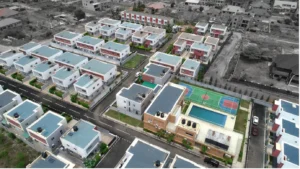Being a real estate developer in Ghana has its own set of unique characteristics, from opportunities for wealth creation to navigating regulatory complexities.
Ghana’s real estate development has seen significant growth and transformation over the years, owing to the country’s expanding economy and urbanisation. In this article, we will look at the role of real estate developers in Ghana, as well as the benefits and drawbacks of this profession.
Advantages of Being a Real Estate Developer in Ghana:
Wealth Creation: Real estate development is a lucrative avenue for accumulating wealth. Ghana’s growing population, urbanisation, and demand for quality housing provide developers with numerous opportunities to make significant profits.
High Demand: Ghana is experiencing a housing shortage, with a sizable portion of the population in need of affordable and high-quality housing solutions. Real estate developers can capitalise on this demand by developing housing projects that cater to a variety of income levels.
Infrastructure Development: Real estate developers are critical to the development of critical infrastructure in Ghana. They help to build roads, utilities, and amenities, which improves the overall quality of life for residents.
Disadvantages and Challenges Faced by Real Estate Developers in Ghana:
Land Acquisition: The complex and time-consuming process of land acquisition is one of the most significant challenges for developers in Ghana. Delays, disputes, and increased costs can result from an inefficient land administration system and overlapping land ownership claims.
Access to Financing: Access to affordable financing options can be difficult for Ghanaian real estate developers. Developers, particularly smaller firms, struggle to fund their projects adequately due to limited access to long-term capital and high-interest rates.
Infrastructure Deficiencies: In some areas, poor infrastructure, such as a lack of water and electricity, can stymie real estate development. Developers may need to invest in basic infrastructure or factor in additional costs to provide these amenities, which will have an impact on project timelines and profitability
Market Volatility: Demand and price fluctuations are common in real estate markets. Economic downturns, changes in government policies, and shifts in buyer preferences can all have an impact on real estate project profitability. Developers must carefully assess market conditions and mitigate risks as necessary.
Being a real estate developer in Ghana provides significant opportunities for wealth creation, owing to the high demand for housing and favourable government policies. However, developers must navigate obstacles such as land acquisition, financing, regulations, infrastructure deficiencies, and market volatility. Despite these challenges, Ghana’s real estate sector is expanding, providing developers with numerous opportunities to contribute to the country’s economic development while also meeting the country’s population’s housing needs.


